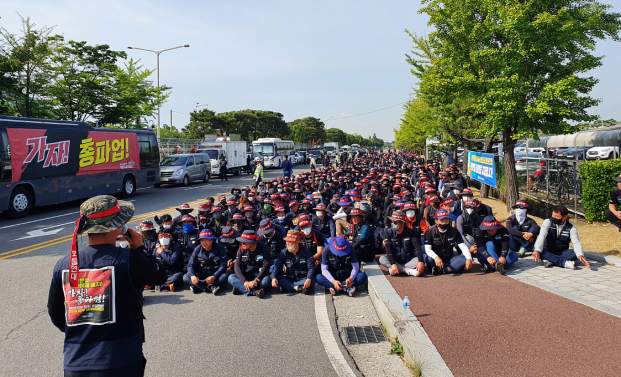South Korea’s trucker strike has disrupted Samsung Electronics‘ chip production in China, the Korea International Trade Association (KITA) said on Tuesday.
KITA said a Korean company that produces isopropyl alcohol (IPA), a raw material for cleaning chip wafers, is facing complications in shipping to a Chinese company that in turn supplies wafers to a Samsung Electronics factory in China.
KITA said in a statement that about 90 tonnes, or a week’s worth of shipments have been delayed.
This is the first concrete sign that the week-long strike is impacting chip production, having already cost South Korean industrial sectors more than $1.2 billion in lost production and unfilled deliveries.
Union Threat to Continue Strike
Samsung Electronics did not immediately comment. It produces NAND flash memory chips, used for data storage in data centres, smartphones and other tech gadgets, at its plant in Xian, China.
The trucker union said in a statement on Tuesday it will continue its general strike and condemned the transport ministry for being “neither willing to talk nor capable of resolving the current situation”.
The union is protesting against soaring fuel prices and demanding minimum pay guarantees. Four rounds of negotiations with the government have failed to find a compromise.
Samsung’s Xian plant had seen production disrupted earlier this year due to Covid-19 curbs in the Chinese city, which caused a global firming of NAND prices.
The tech giant has two production lines in Xian making advanced NAND flash products, which account for about 43% of its total NAND flash memory production capacity and 15% of the overall global output capacity, according to TrendForce.
- Reuters with additional editing by Sean OMeara
ALSO READ:
Truck Drivers Strike Prompts Hyundai to Ramp Up Output
Truckers’ Strike Halves Output at Hyundai’s Biggest Factory
Indonesia’s Pertamina Averts 10-Day Strike by Workers






















